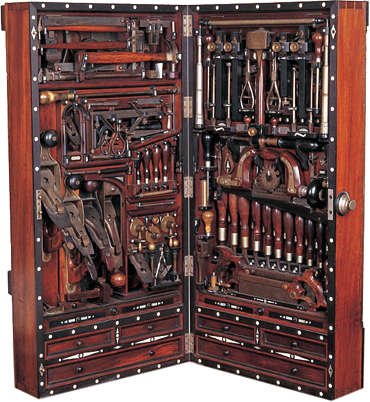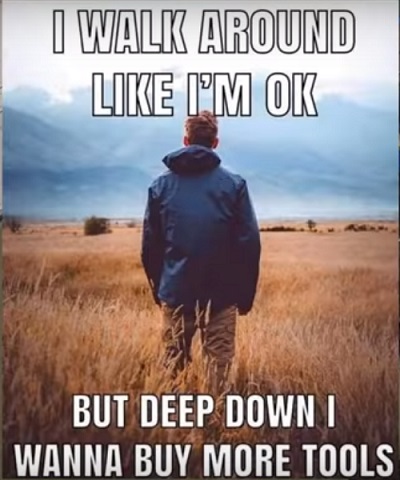
[Source]
Let's Adore Jesus-Eucharist! | Home >> Varia >> Bachelor's Kit

[Source]
We have all been told at some point of time that "Good tools are worth it", or something to the effect. Why is this? And how do we go about obtaining good tools?
I'm not an expert on this topic, but I'll try to give you the best advice I can. Please notify me if you have any improvements to suggest for this text.
I've never felt the need to be an Opera Singer, except just now. Ideally, I'd break out into a rousing rendition of "Caro nome", in Verdi's Rigoletto, except instead of some bone-headed Italian lyrics about human love, it would be an English love song about "Dear tools"! Yeah! Maybe that would begin to convey just how important good tools are!
Here are some reasons why good tools are important:
2.1) To work safer. Safety first. Good tools reduce accidents.
2.2) To get the job done. Tools that are bad enough won't even let you do the job!
2.3) To work faster. Time is money, and good tools let you finish the job faster.
2.4) To work better. High-quality results require high-quality tools.
2.5) To have fun at work. If you don't have a tool at all, at least you don't waste your time trying. But if you have a bad tool, you're almost able to do the job, and then, like Sisyphus, everything will fall apart and you'll have to start over!
2.6) To make more money. A worker who obviously has clean, well-organized and top-notch tools will get more contracts.
2.7) To leave a good legacy. Good tools last long, and tend to be passed on from one generation to the next.
What happens if you don't have good tools? Time and time again, I've heard newbies whining that they "just don't have any talent", but as soon as the proper tool was put into their hands, they too suddenly felt like being opera singers!
Strictly speaking, it is very hard to know you have a good tool in your hands. For example, tools made of metal castings must be "seasoned" for months and even years, to give the metal casting time to relieve internal stresses before machining it. If you don't do this, the tool might warp badly after you've purchased it! Therefore, in theory, you would need to have seen the tool built before your very eyes!
After having it built yourself or seen it built in front of you, the second best method of recognizing a good tool is to try before you buy. Ideally, you borrow a buddy's tool and use it to perform real work on a real project.
Normally, you can't really use a tool for a fairly long period of time doing hard work before you buy it. So the third (and least desirable) method to recognize a good tool is to seek out clues that the tool is good. They are not a guarantee, but they increase the probability that you're holding a good tool:
3.1) Price, price, price. The single most important clue that you're holding a good tool is the high price. Of course, there are exceptions (see #4 here below).
3.2) Fit and finish. Almost always, tools are manufactured from several components. With a bit of practice, you can learn to notice sloppy workmanship: poorly deburred edges, wobbly parts, rough machining, etc.
3.3) Geometry. Since we learn about circles, squares and flat planes in grade school, we tend to think those entities are commonly found around us. Nothing could be less true! In real life, nothing is perfectly straight, or flat, or spherical, etc. In real life, everything is "plus or minus". A straightedge is "straight, plus or minus X millimeters over one meter". A square is "90 degrees, plus or minus X fractions of a degree", and so on. This also explains why good manufacturing plants have a "metrology department", with staff that just walk around all day, checking that lines are straight enough, that circles are round enough, etc. When buying more expensive and complex tools, it becomes important to actually have with you a machinist's square, a straightedge, etc., to actually check whether the tool has the shape it's supposed to have.
3.4) Materials. The exact same tool can be made of widely differing quality of materials. Think of drill bits, which can be orders of magnitude more expensive if you chose higher-quality metal.
3.5) Ease of disassembly and reassembly. Almost always, a tool that can be easily disassembled and reassembled will be of higher-quality (not to mention easier to maintain and repair!).
3.6) Reputation. It is perhaps the least-important clue, but it should be taken into consideration. Ask around, find out what the pros use, read trade magazines, etc.
Price is the best indicator of quality for a tool, but there are some exceptions. Among them:
4.1) Luxury. Yes, you can have a hammer with a gold-plated handle, or a marking gauge made of ivory instead of plastic, but that doesn't make the tool work any better.
4.2) Outdated technology. For example, good sharpening stones used to be made of natural Hard Black Arkansas stones. These days, a synthetic diamond stone works better, and costs less.
4.3) Unnecessary features. When I say that normally the more expensive tool is better, I assume that you are comparing two tools with equal capabilities, and capabilities suited to your needs. If you just need to hack off a few pieces of lumber for your back porch, I'm not telling you to go buy a 10,000$ professional-grade bench saw, instead of an little Japanese plywood handsaw worth 40$!
Some people might want me to add another reason not to spend more: long life. Some tools are more expensive, because they will last much longer, and some people say in those cases you could by the less-expensive tool.
I tend to think otherwise. If you're not going to use the tool very much, maybe you should rent it, or hire a skilled worker to do that job instead of buying some cheap tools to do it yourself. And if you do buy the tool, buy the good one. It will give you joy every time you use it, and you will leave it to your children when you die.
If you don't have kids, you have a serious problem. We must all have children, either physically (as in marriage) or spiritually (like good teachers, or Nuns and Priests, etc.).
Buying a good tool isn't enough. Often, what you buy in a store is more a kit than a tool, and you'll almost have to "rebuild" the tool to make it operate correctly. Also, there is the whole issue of learning the skills to use that tool.
But a good tool is a very good start!

Let's Adore Jesus-Eucharist! | Home >> Varia >> Bachelor's Kit